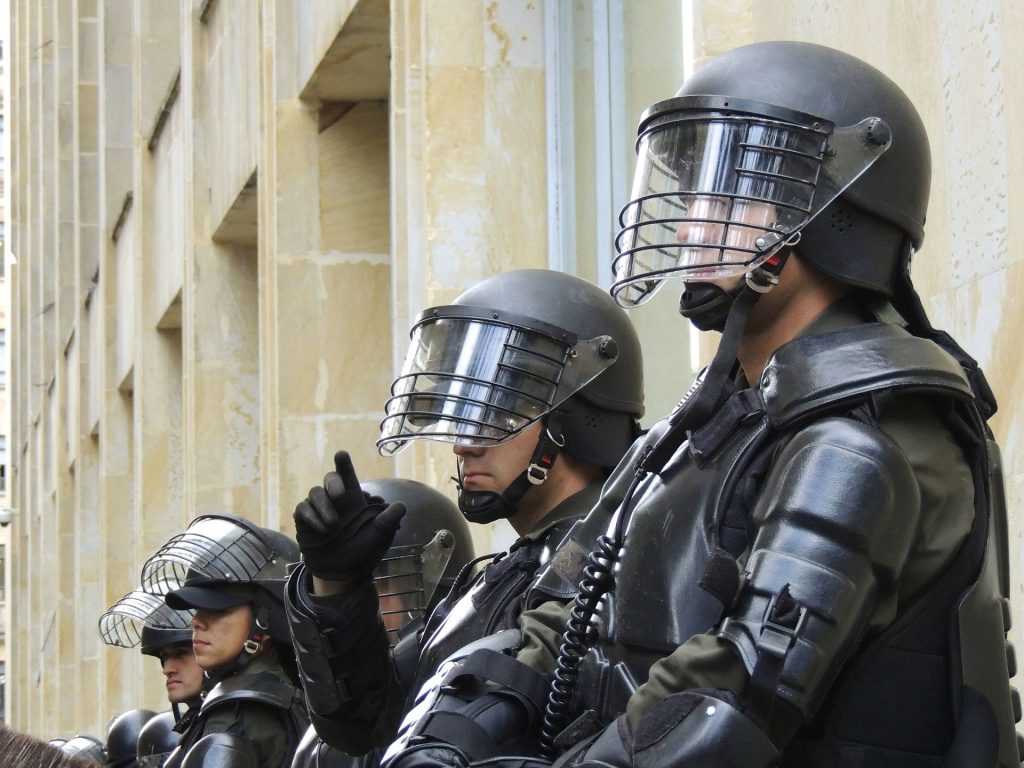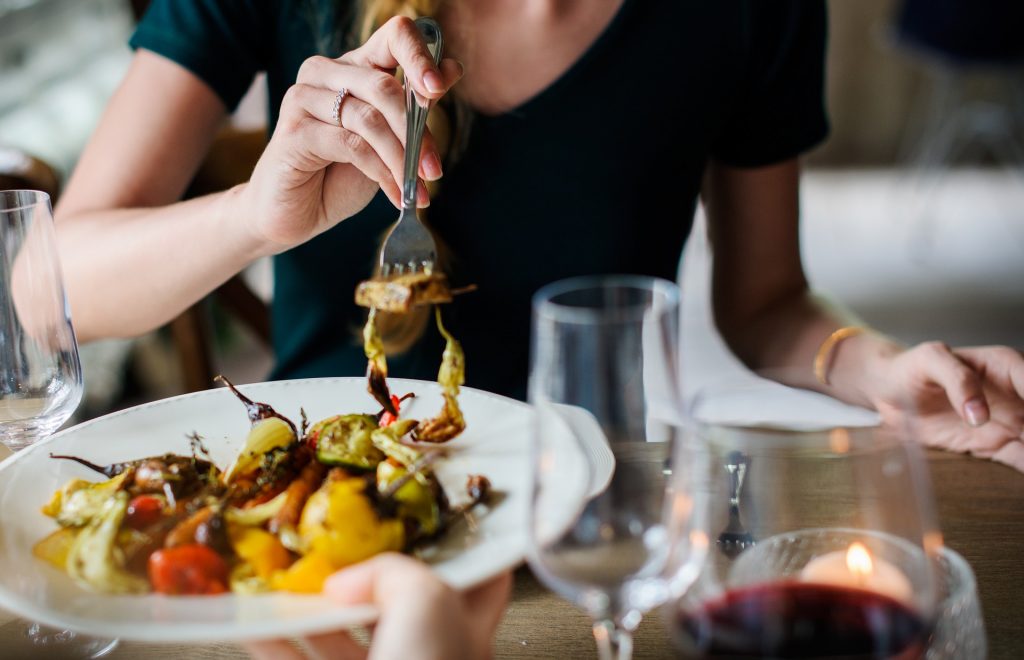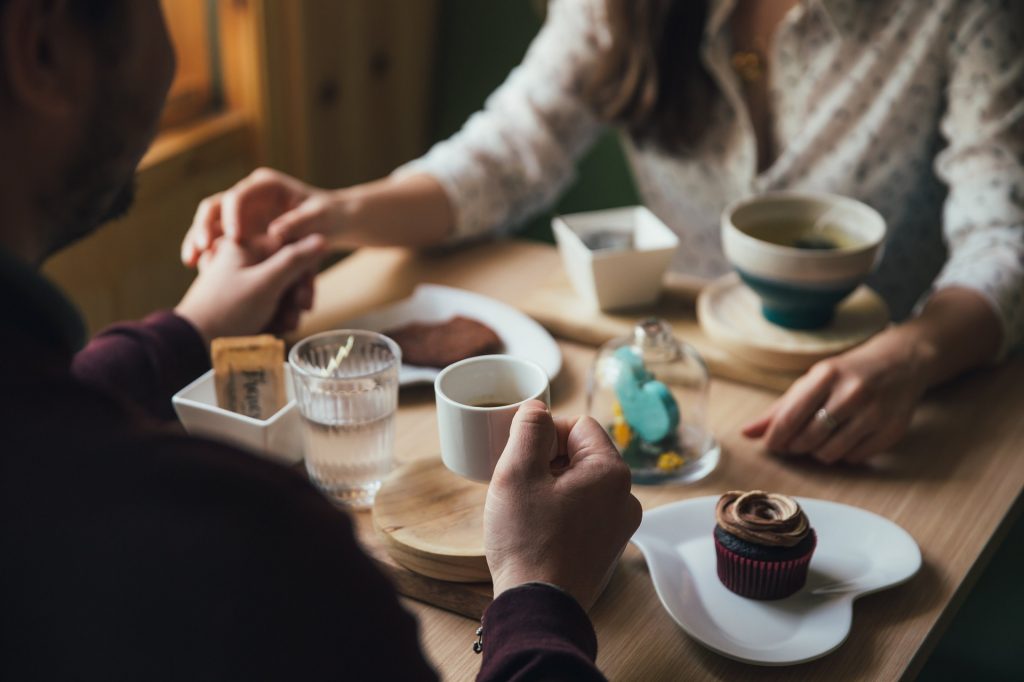Monday, 17 September – Denizli
Monday morning, the third week of the walk, I packed up my stuff and said goodbye to Metin and the gasoline station attendants. Then, as the sun rose from behind the hills, I walked to the main road out of town.
It was already hot and humid at 8 a.m., so after walking only half an hour I sat down in the shade under a tree, opened a bottle of water, took a big drink, and began eating a package of cookies — my breakfast.

Turkey’s Prime Minister, Tayyip Erdoğan, was scheduled to visit Denizli that day. His motorcade from the airport would be traveling the road I was walking, so there was a lot of security out even in the early morning.
Three cops from the security detail came over to take their break with me, and we sat down at a nearby picnic table. They asked me about the lives of American cops. I am not a cop, I do not have any cops in my immediate family, and I don’t have any close friends who are cops. So I was having a bit of a hard time accurately representing the lives of American cops. Most of what I knew about the lives of American cops came from the movies, and I told these cops that, but they didn’t seem to mind.
“What is an American cop’s salary?”
I took a wild guess.
“What is police academy like in America?”
I took another wild guess.
“How well does an American cop relate to the public compared to a Turkish cop?”
I was better equipped to field that question.
A call came over their radios summoning them back to work. They hurriedly finished their snacks, said a hasty goodbye to me and scurried back to work. I stayed behind to finish my breakfast in a more leisurely fashion and enjoyed the silence.

A few minutes later I stood up, pulled my pack back on, and resumed walking out of town. I wasn’t on the road for ten minutes when I heard a car driving up behind me on the shoulder, honking. I figured this was Turkey and cars drive on the wrong side of the road and honk their horns all the time, so I didn’t even look back. But the car wouldn’t go away. It kept following me and honking so I turned around to see what was going on.
It was Meltem, one of the three women I had met at the gasoline station on Friday. She pulled on the emergency brake, jumped out of the car, and grabbed me by the arm.
“Here! Come with me!” she ordered, beginning to drag me by the arm to her car before I could say hello.
She stopped suddenly. “No, wait!” She tightened her grip on my arm and abruptly turned. Then she dragged me toward a market across the parking lot. “I need to get something,” she said.
As we climbed some stairs towards the market, two cops taking a break in the shade laughed at us and said to Meltem, “You got yourself a foreigner!”
“He’s not for me,” Meltem said as she marched me past the cops into the market.
When it comes to relations between the genders, I am not known for being quick on the uptake. However, when she said those words to the cops I realized she was flying wingman for someone. I was the target. I’d just been acquired.
So we went into the store and she bought a pack of gum, all the while gripping my arm. Then she pulled me out of the store and to the passenger side of the car.
“Get in,” she ordered. I reminded her of my backpack, so she let me take it off and stuff it into the back seat of her car. “Let’s go to the office,” she said. “Ayşe is coming.”
Ah, Ayşe. I had no problem with that.

We drove to Meltem’s office, which was only a few hundred meters back down the road. It turns out her desk faced the road, and she had called Ayşe when she saw me walk past with my backpack. Ayşe had told her to go get me and then call her.
At the office, Meltem sat me down at a picnic table outside. A group of Meltem’s male co-workers drifted out of their offices, gathered around, and began questioning me. But Ayşe raced up just then and parked her car and jumped out.
“It’s too crowded here!” Meltem told her, waving her back. “Let’s go to a restaurant.” The three of us climbed into Meltem’s car and drove a couple hundred meters to a nearby restaurant.
Meltem and Ayşe both seemed to know the waitstaff well. I took it they must be regulars there. The waiters seated us out on the patio at a table with a clean, white tablecloth under a thick, leafy green canopy of trees. I looked around and noticed that the restaurant was deserted except for the three of us. Two ducks swam by us in the stream below, a male and a female. They looked content. Meltem, Ayşe, and I ordered iced tea and some munchies. I had been interrupted while working, but I was liking the interruption.
Ayşe and Meltem asked me why I had stayed a few extra days in Denizli. Had I met someone at the wedding? They began to banter between themselves. Maybe so. No, perhaps he stayed for one of us. Who did he stay for? He stayed for you. No, he stayed for you. No, he stayed for you. No, he stayed for you.
I thought, Actually, I didn’t stay for either of you. I was walking out of town when you stopped me.
Meltem left the table for a few minutes, saying she needed to attend to some business. Ayşe and I shared a moment of awkward silence. I broke it by saying, “You know that woman I stayed for? She’s you.”
I felt ridiculous saying that, being that I had been walking out of town just an hour before. But Ayşe seemed to like it. She turned her face away from me, and I could see she was grinning from ear to ear.
Meltem came back to the table, and the three of us resumed making small talk. After a while, I excused myself and went to the restroom. When I returned to the table I told them I would need to leave soon, I had some walking to do.
“Have dinner with us,” they said.
“I would love to, but I have already been in Denizli for three nights. I need to walk.”
“Stay in Denizli… One more night… What’s one more night?… Have dinner with us.”
I sat back down and thought. I needed to walk. I had to get my miles for the day. It was my job. But only a fool would turn down a dinner invitation from these two. Surely there must be a way to make this work, I thought.
“Okay,” I said after some quick thinking. I told them I would leave my pack at the restaurant, walk my quota for the day, hop a bus back to Denizli, meet them for dinner, and then stay in Denizli one more night.
Our plans for the evening made, I stood up and walked over to the waiter to ask for the bill. He looked at me, and then he looked over at Meltem and Ayşe, who were gently shaking their heads and staring him down with cold, icy stares that seemed to say, “If you let this man pay, we will use a dull knife to remove your testicles.” The waiter looked back at me, smiled sheepishly, and said, “Sorry, you are not going to pay for this one.”

Meltem and Ayşe stood up and the three of us prepared to leave. “Let’s meet back here at 8 p.m.,” they proposed.
“No, 7 p.m.,” I countered, thinking about having to get up early the next day to resume walking.
“No, 8 p.m.”
“No, 7 p.m.”
“Ooof yaa,” Ayşe said, rolling her eyes at me. “Okay, 7 p.m.”
So I left my backpack at the restaurant and went back out to the main road to continue my walk out of Denizli.
The road east of Denizli was lined with granite mining and cutting operations. As such, that side of the city was unusually heavy with rock dust and quite industrial. The roads were clogged with trucks belching thick clouds of exhaust, as they had been when I first entered Denizli three days earlier. But this time I had a smile on my face and I could hear the birds singing.
I ended the walk for the day up on a plateau at a village called Kocabaş. It had one of the largest Turkish flags I had ever seen. I took a selfie of myself standing in front of that flag, and then I waved down a passing minibus and rode back to Denizli for dinner.
I arrived at the restaurant at about 6 p.m. The waiters recognized me from earlier in the day and pointed me to a restroom where I could clean up. I spent the next half hour taking a sponge bath and trying to comb my hair as best I could.
A few minutes before 7 p.m., I asked the waiters if I could take a seat early and they escorted me to the same table where we’d eaten lunch. I sat drinking water and dipping bread into olive oil. Meltem and Ayşe arrived at 7:30, taking their seats and waving off the waiter’s offer of menus.
About 5 minutes later, Meltem took a quick call on her cell phone, stood up, and said she needed to attend to an emergency at work and would need to leave the restaurant. As she got up to leave I couldn’t help but admire her consistent and disciplined execution of a wingman’s duties. If you looked up “wingman” in the dictionary, you would see a picture of Meltem.
Ayşe and I ordered dinner and made small talk. By the time the food came, we were so busy talking we barely ate. At one point Ayşe reminded me to eat, my food was getting cold.

“I can eat anytime,” I said. “Right now I am with you.” The conversation continued. Both plates of food grew cold and were largely ignored.
The waiter knew a little English, and when the conversation moved on to more advanced subjects he was called in to translate. At first, he would just translate a few sentences here and there as he walked by, but he gradually became a more permanent fixture at our table. He may as well have taken a seat. I did not like this development. I was not having dinner with the waiter, I was having dinner with Ayşe.
Come on Ayşe, I thought, we have to get rid of this guy. Help me out here. This restaurant is your territory. Let’s get rid of this guy.
She did get rid of him, but not how I thought she would. “I know no English at all,” she told him. Her face was tense and her eyes watered. “What do I do? I want to understand this man.”
“Well then,” the waiter said, “Talk to him. You will have to talk directly to him, not to me.” He turned and left the table. Moments earlier I had wanted to push him off the ledge into the water below, anything to get him to leave, but now I wanted to thank him. I had badly wanted Ayşe to talk only to me, to look only at me. Now the waiter was leaving her no choice.
Ayşe turned to me, looked into my eyes, and we sat like that talking for almost two hours, not taking our eyes off each other. We barely acknowledged the waiter when he came back to clear our plates, or refill our water glasses, or ask us if we’d like to order dessert. It was one of the most challenging conversations of my life. I was not only struggling to keep her engaged with me in a language I barely knew, but I was also struggling to answer questions more personal than any I had ever had to answer before in English.
Ayşe was an unusually patient and determined conversational partner. As deep as I was digging to make the most of my Tarzan Turkish, she was digging as deeply to understand the awkward stranger sitting across the table from her. It had been a long time since anyone had bothered to discuss such personal subjects with me in any language, and if she was going to be patient and determined with me, I was going to be patient and determined with her.

At 11 p.m. Meltem returned. She tapped Ayşe on the shoulder. “We’ve got to go now,” she said. As we pushed back from the table, Ayşe asked me, “Where are you staying the night?”
I blinked, disoriented. Oh shit, I usually would have taken care of that detail by now. I said, “At the gasoline station, I guess. They’ll probably let me stay there another night.”
We loaded into Meltem’s car and took a back route to the gasoline station. Metin was there as well as some of his friends. I greeted them and asked if I could stay another night. “Of course,” they said.
As I unloaded my backpack from the car, I began to hear the raucousness of a Turkish argument rising from inside the station. I hurried inside and found Ayşe and Meltem in heated disagreement with Metin and his friends. I understood some of the words, but there was something else going on that I didn’t understand. I remembered, yet again, that the people around me had histories I was not aware of, and that sometimes, as restrained and polite and respectful as I tried to be, I would step on some toes. I suspected this had been one of those times.
Ayşe pulled me to the side as I entered the building and whispered, “Don’t worry about it, everything will be okay.” I nodded back to her like I knew what was going on, but thought to myself, No problem, I don’t even understand what you guys are talking about, I just want to go to bed.
They stopped their bickering, and Meltem and Ayşe and I said a hurried and awkward goodnight to each other. Then the two of them got back into Meltem’s car. Meltem, flustered from the heated conversation they’d just had with Metin and his buddies, forgot to put the car in reverse and drove it straight into the side of the gasoline station. She jumped out of the car, and we inspected the damage, deciding it was not a big problem. Then Meltem and Ayşe got back in and drove away. I laid my sleeping bag out on the office floor for the third time in four nights and fell asleep.









